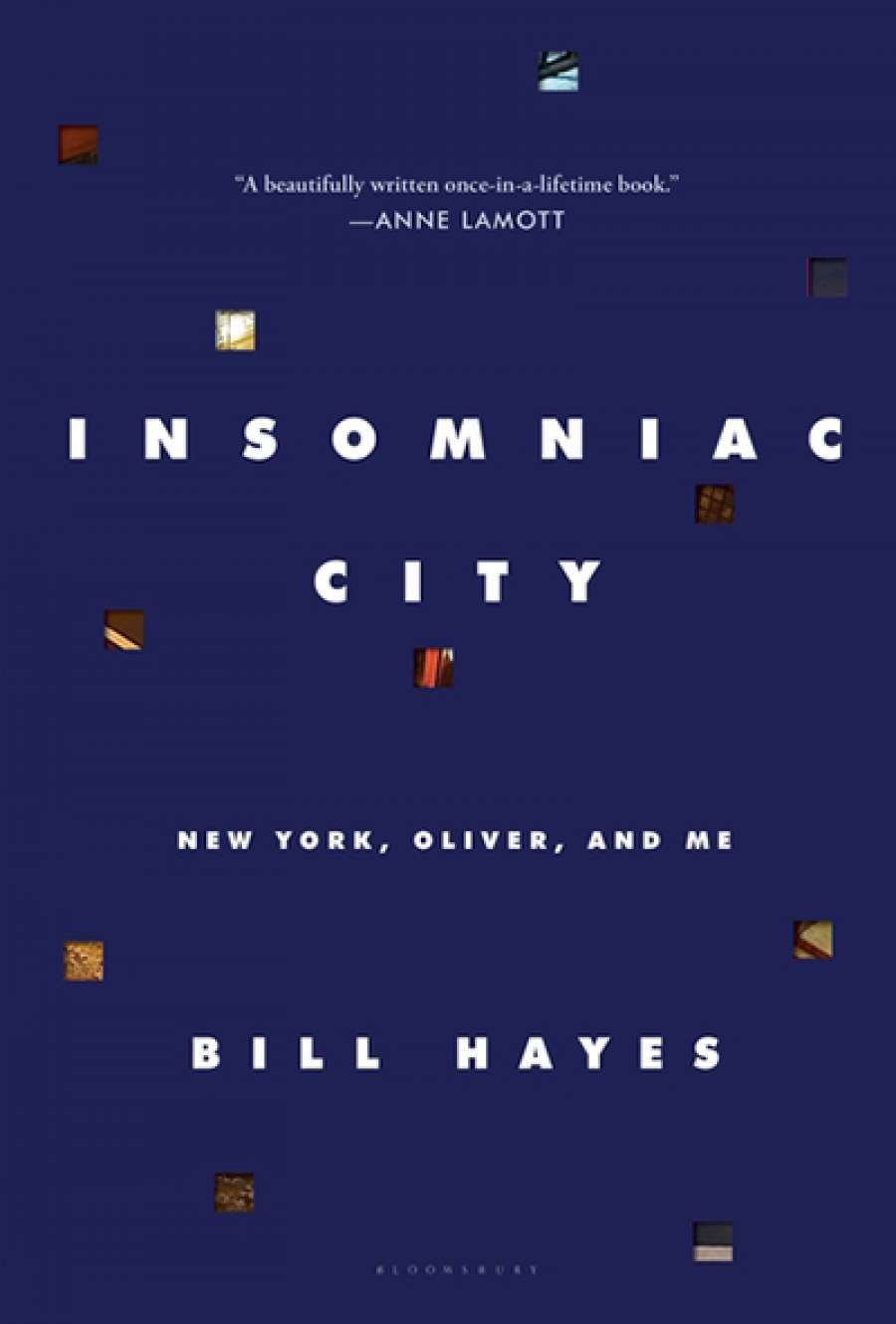
- Free Article: No
- Contents Category: Memoir
- Custom Article Title: Suzy Freeman-Greene reviews 'Insomniac City: New York, Oliver, and me' by Bill Hayes
- Book 1 Title: Insomiac City
- Book 1 Subtitle: New York, Oliver, and me
- Book 1 Biblio: Bloomsbury $29.99 hb, 304 pp, 9781620404935
This is a memoir bookended by deaths. It begins with the loss of Hayes’s partner, Steve, who died in bed of a cardiac arrest at just forty-three. It ends, as we know it will, with Sacks’s death from cancer at the age of eighty-two. The prose is poetic, deeply felt, but never mawkish or prurient. Between journal entries about his life with Sacks, (or O as he calls him), Hayes writes about the people he meets and photographs as he roams Manhattan and rides the subway: Kenneth, a young man in a business suit quietly weeping on the train; Ali, who runs the local tobacconist; Sunny, a Sri Lankan taxi driver who declares he will remain a virgin until married.
At first I was so greedy for time with O that I almost resented these tales of New York, where life, as Hayes puts it, ‘is a John Cage score, dissonance made eloquent’. But they grew on me. They are finely observed. In depicting a wider, grittier world, they ensure this memoir is outward-looking, never self-absorbed. Given the curiosity and generosity of spirit that characterised Sacks’s writings, this seems apt.
Still, it is O who is the star of this book, or more precisely, O’s brain. He savours words like ‘triboluminescence’; gets stoned on cannabis chocolates, then forensically describes his hallucinations; plays Schubert on the piano, though half-blind; and marvels at the ‘living geometry’ of the local skate park. As the pair listen to Bach one night, he says, ‘Wouldn’t it be nice if there were a planet where the sound of rain falling is like Bach?’ There are lovely anecdotes about his brushes with fame: a lunch at Björk’s house in Reykjavík – like something from a fairy tale with its staircase made of whale rib bones – and a hilarious encounter with the model Lauren Hutton, who latches onto Sacks at a chamber orchestra concert. (‘Hey doc, you ever done Belladonna?’) O hasn’t a clue who she is.
Hayes, in turn, is teaching O new things, like how to share a life with someone and how to open a bottle of champagne (which O does wearing swimming goggles, just in case). In closely observing the world around him, he is moving through his grief over Steve’s death. The tall trees outside his apartment window fascinate him. Whipped by wind, rain, and lightning, they are ‘not fighting this storm but yielding to it’. Their species, he notes, has evolved to survive.
 Oliver Sacks (photograph by Maria Popova, Wikimedia Commons)The last fifty or so pages of this book – so tender, intimate, restrained – are painful to read. A recurrence of a melanoma has metastasised to O’s liver. He takes the news calmly (he is not interested in ‘prolonging life just for the sake of prolonging life’). Soon after, he writes a list of eight and half reasons to remain hopeful. ‘1. An easy death (relatively). 2. Time to “complete” life’, and so on.
Oliver Sacks (photograph by Maria Popova, Wikimedia Commons)The last fifty or so pages of this book – so tender, intimate, restrained – are painful to read. A recurrence of a melanoma has metastasised to O’s liver. He takes the news calmly (he is not interested in ‘prolonging life just for the sake of prolonging life’). Soon after, he writes a list of eight and half reasons to remain hopeful. ‘1. An easy death (relatively). 2. Time to “complete” life’, and so on.
After surgery to cut off the blood supply to the tumours, O is in so much pain he keeps tearing off his hospital gown. Hayes calms him by reading from a book on the elements. As his condition worsens, O either rests or writes with his fountain pen and notepad. ‘The most we can do is write,’ he reflects, ‘intelligently, creatively, critically, evocatively – about what it is like living in the world at this time.’ He gradually lets go of everything inessential, barely eating, keeping his eyes closed when not writing.
When O’s breathing slows, in the last phase of dying, Hayes clears away the medical detritus littering his room – the oxygen tank, the pads and medications – and brings in the things O loves: his books, his ‘beloved minerals and elements’, his fountain pens, a fern, a cycad plant, and a ginkgo fossil.
Later, when the funeral directors have taken O’s body away, Hayes returns to his own apartment. He feels ‘tired, grateful, peaceful, battered, sad, wise, old’. Once more, he is grieving in New York. But he has made something beautiful and wise from his sadness. After finishing Insomniac City, I started looking at trees, really closely, and I found myself uncharacteristically chatting with a woman from Lahore on my morning bus.


Comments powered by CComment